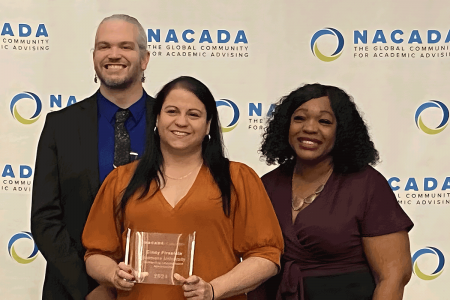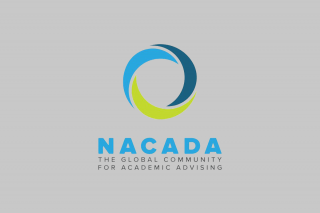“In college, I was one of those people who was involved in everything, and I liked helping everybody. . . . So when I realized that I could support students for a living, I was very excited,” recalls Cindy Firestein, Director of Undergraduate Advising at Simmons. “Academic advising requires the right combination of skills, experience, and passion. But you cannot learn or teach a passion for helping students, it just has to be there.”
This past summer, the National Academic Advising Association: The Global Community for Academic Advising (NACADA) notified Firestein that she received an Outstanding Advising-Administration Award. As part of the organization’s Global Awards Program, this recognition “honors individuals and institutions making a significant impact on academic advising.” The administration designation alludes to Firestein’s efforts to lead new programs for emerging professionals within NACADA. (In 2017, she received her first Global Award from NACADA, specifically for academic advising). This year’s awardees were honored in October at NACADA’s 2024 annual conference, which was held in Pittsburgh, PA.

“Being a member of NACADA is an awesome way for higher education professionals interested in academic advising to learn best practices, network, and cultivate new skills,” explains Firestein. Founded in 1979 and based at Kansas State University, NACADA is a volunteer-run global community for academic advising professionals. The organization also provides opportunities for leadership, conferencing, and publishing. NACADA is divided into 10 geographical regions. Firestein belongs to Region 1, which encompasses New England, New York, and parts of Canada.
Cultivating Mentorship
In the course of her own professionalization, Firestein noticed a lack of mentorship for early-career academic advisors. “I have had many great supervisors, but I had to advocate to get professional development opportunities or leave positions to grow in my career. Mainly, I observed my past supervisors and learned from them that way. . . . When I came to Simmons in 2017, I received substantial professional and collegial support, particularly from Dr. Nakeisha Cody, Vice President of Student Success and Diversity, and Dr. Katherine Paden, former Deputy Provost,” she recalls. From 2018 to 2020, Firestein also benefited from being an Emerging Leader in NACADA’s Emerging Leaders Program, which nurtures diversity within the organization.
These generative exchanges influenced Firestein to develop a specialized mentorship program for NACADA, though the global pandemic postponed its implementation. “By 2024, I was able to launch a first-year pilot program for Region 1 with my co-chair, Marissa Balogh (Coordinator of Transfer Student Success, University of New Haven), in which experienced academic advisors mentor junior professionals in the field,” says Firestein. “So far it is going quite well, and I have received positive feedback from the mentors and mentees in our pilot.”
Expanding Academic Advising at Simmons
As Director of Undergraduate Advising, Firestein offers the academic support that Simmons students need to achieve their goals. Her team in the Office of Undergraduate Advising at the Center for Student Success focuses on first-year students in particular, while also supporting adult learners (including Dix Scholars) and online learners (including Online students students, who are often adult or transfer students), with an eye toward student retention. More recently, Simmons advisors are helping prepare students for graduate school applications, especially students pursuing pre-health and pre-law tracks of study. The Undergraduate Advising webpage offers information on how students can arrange advising appointments, as well as instructions for joining hybrid drop-in hours.
Once undergraduate students declare a major, they are assigned a faculty advisor. “We work very closely with Simmons faculty. We practice a hybrid advising model that engages professional advisors who support undeclared students and faculty advisors who advise students following a specialized course of study,” explains Firestein. “We always say that it takes a village to support our students, which is true for both Online Degree Completion and on-the-ground students.”
Firestein notes that Undergraduate Advising, like the University, is changing to meet the demands of the times. “When I started at Simmons seven years ago, advising focused primarily on fostering academic success among first-years and academically at-risk undergraduate students. Now, we are evolving to prepare students for their respective careers by cultivating professionalization and providing internship opportunities in collaboration with faculty, external partners, and the Career Education Center,” she explains. “We are supporting students not just here [at Simmons], but there [beyond Simmons] in their next steps in their careers.”
Under Firestein’s leadership, advising has become more expansive. “Lately I feel that the term ‘undergraduate advising’ is a bit limiting, as it does not showcase all of our work,” she says. Although academic advisors are not counselors, they do play an important role in supporting students’ wellness and mental health. “We are part of a process that ensures that students are supported and have the resources they need to succeed — academically and emotionally.” Accordingly, Undergraduate Advising collaborates closely with the Counseling Center, the REEF Support Center, Vice President for Student Engagement and Dean of Students Rae-Anne Butera, and beyond.
During the COVID-19 pandemic, Firestein became especially invested in students’ wellness. She (co-)authored several articles in Academic Advising Today, one of NACADA’s signature publications. In an article co-authored with Neena Fink and entitled “Advising Generation Z Students During COVID-19 and Beyond,” Firestein writes: “Now more than ever, students will rely on advising for mental wellness and emotional support, guidance, resources, strategies, and human connection.” As she reflects, “The pandemic made me realize that it was crucial for us to start addressing students’ mental health struggles. I wanted to be their advocate.”
Rewards of the Profession
Since Firestein specializes in adult learners and students who struggle academically, witnessing their improvement and success gives her profound gratification.
“When a student who has been on academic probation for a couple of semesters runs into my office and tells me about receiving an A or B in a difficult course, it is deeply rewarding,” she says. “After months of struggling, they elevate their GPA and swing by to say thank you. This is a major highlight of my career.”
Commencement ceremonies are especially memorable for Firestein. “Another highlight is when I see one of my adult learners crying as they receive their college diploma,” adds Firestein. “I am so proud of them because I know their story, and they did it . . . I always smile at graduation.”

